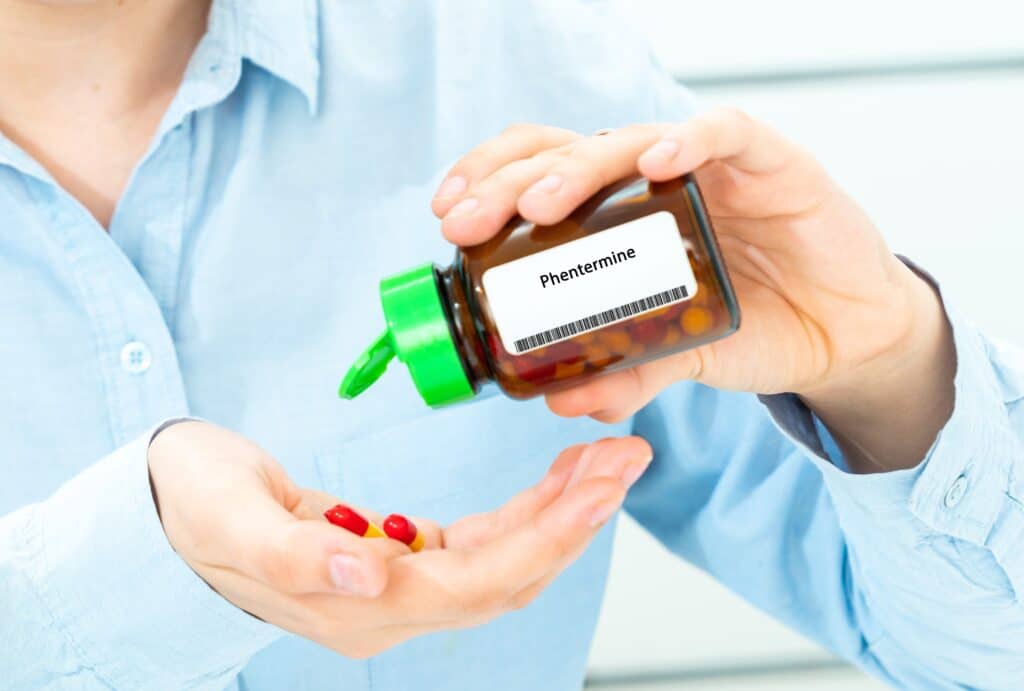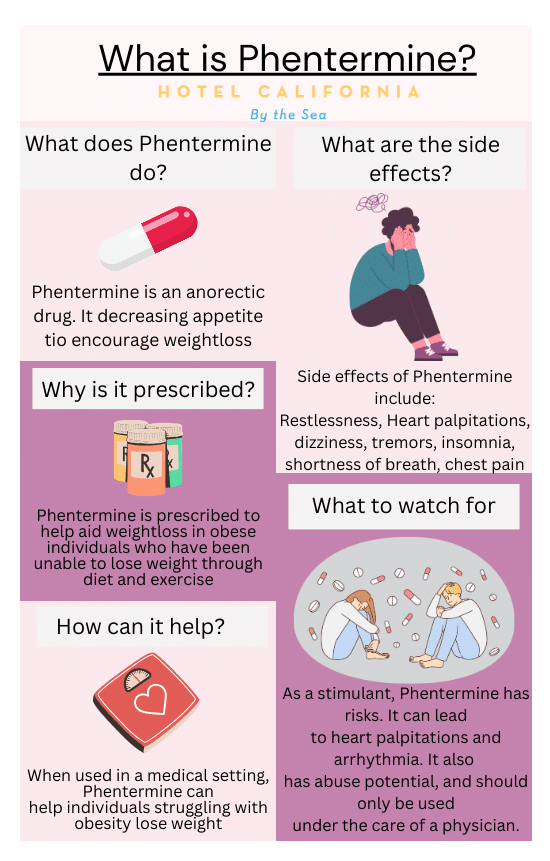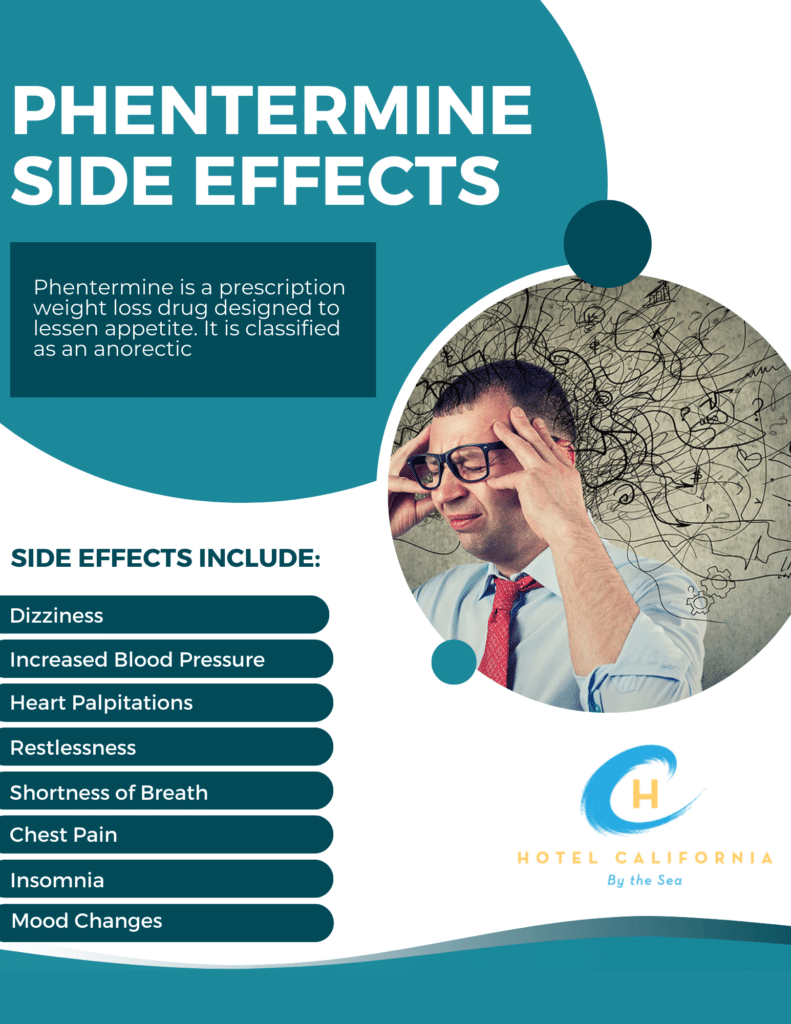Is Phentermine Addictive?
Phentermine, also known as Adipex, is a prescription medication for the treatment of obesity and weight loss. Modern diet pills like phentermine were introduced as a replacement for amphetamines to help appetite suppression in people struggling with weight loss. Phentermine is a class of drugs called anorectics and is an amphetamine and stimulant that affects the central nervous system. It can increase energy and feelings of euphoria, making users susceptible to developing dependence and addiction.

Obesity has become an epidemic around the world increasing by an estimated 300% since 1975. Phentermine, a prescription drug, is considered the most popular medication option for those who are looking to lose weight through pharmaceuticals.
Phentermine is a sympathomimetic amine anorectic. Similar to amphetamines, it stimulates the central nervous system and the release of the chemicals norepinephrine and epinephrine. Phentermine does have the potential for dependence and addiction. However, addiction to diet pills is uncommon. If an addiction does develop, it is usually accompanied by co-occurring mental health illnesses such as an eating disorder, or the usage of other mind-altering substances such as alcohol.
What is Phentermine?
Many prescription diet pills are categorized as a schedule III or IV under the Controlled Substances Act. Other common weight loss medications include Wegovy, Orlistat and Ozempic. Phentermine was first introduced in 1959 and in 2012, the Food and Drug Administration approved a combination of phentermine and topiramate as treatment for obesity. The two drugs are often used together because they help users decrease appetite and weight loss as well as help to maintain weight loss. The combination of the two drugs is often prescribed for short-term obesity treatment accompanied by a healthy diet and exercise.
Diet pills work by interfering with the body weight process. It suppresses appetite, increases metabolism and prevents fat absorption in the body. Phentermine is a stimulant drug that increases the body’s ability to burn fat and create short duration bursts of energy. However, this also causes an increase in heart rate and blood pressure. These side effects can cause a whole host of other issues to consider when taking diet pills like phentermine.

Side Effects of Phentermine Abuse
- Shortness of breath or trouble breathing
- Chest pain
- Swelling in the legs or ankles
- Tremors
- Unusual changes in mood and behavior – decreased mood with low energy
- Increased blood pressure
- Itching
- Dry mouth
- Stomach pain
- Diarrhea and irregular bowel movements
- Insomnia and hallucinations
- Hypertension
- Altered hunger cues
- Altered times for digestion
- Psychological obsession with thinness
- Anatomical changes to the brain
- Cognitive impairment, lapses in memory and impaired judgment
- Mood disorders such as anxiety and depression
- Primary Pulmonary Hypertension (PPH) – a condition that affects the arteries in your lungs and the right side of your heart
- Valvular Heart Disease – a condition in which the heart valves cannot open or close properly
Is Phentermine Addictive?
Phentermine works by blocking the hunger signals in the brain and enhancing the body’s release of catecholamine. Catecholamines are chemicals produced by the adrenal gland that produce hormonal effects such as reduced appetite and elevated heart rate. It also triggers the release of norepinephrine, dopamine and serotonin. These chemicals are known as pleasure chemicals that affect the reward system in the brain. Over time it is possible for a user to become dependent on the high releases of these chemicals. Once dependence is developed, addiction will follow. However, this is more likely to occur in users who already have a personal history or family history of substance abuse.
Another form of addiction to diet pills is through the need and feelings of self-control and body image. In a research study, about 24 million Americans suffer from an eating disorder. According to research from the University of Minnesota, an estimated 20% of girls ages 19 and 20 have used diet pills. On average, two-thirds of girls routinely practice “unhealthy weight control behaviors.”

Diet pills such as phentermine fuel addictions that are often caused by eating disorders and other co-occurring mental health conditions. When misused, diet pills can have a very destructive impact on the body and provide users with a false sense of control. In those with eating disorders, it manipulates the brain into thinking the user has the ability to control their body’s weight. Users who are addicted to diet pills can find themselves engaging in behaviors that perpetuate poor body image. These behaviors include obsessive calorie counting, consistent berating of physical body image, food guilt, fear of food, constantly thinking and obsessing over food and restrictive eating.
Phentermine and other over-the-counter diet pills are easily available and accessible. This makes it easy to obtain and for addiction to develop quickly and quietly. Other factors that influence diet pill addiction include individual biological factors, environmental factors, friends and family, age of use and duration in which the drug has been used.
How long does Phentermine stay in your System?
Phentermine has an estimated half-life between 19-24 hours, with an average half-life of 20 hours. Half-life is the time it takes for the body to metabolize about 50% of the medication. High doses of phentermine can last up to 40 hours in the body. It can take anywhere between 5-6 days for phentermine to completely leave the body. Despite the medication lingering for a long period of time, the effects of phentermine only last between 4-12 hours.
What happens when you stop taking Phentermine?
So what happens when you stop taking and abusing diet pills like phentermine? Some of the side effects can include:
- Experiencing extreme hunger due to your body attempting to return to its set point weight
- Your appetite will increase because it has been suppressed for a long period of time
- You may experience a weight loss rebound that can increase past your starting point weight
Check Your Insurance Coverage for FREE
Find out if your insurance covers addiction treatment in minutes. We accept most insurance!
Phentermine and Alcohol
The combination of phentermine and alcohol can lead to dangerous side effects. Phentermine is a central nervous system stimulant and results in brain activity and communication to move at a faster pace. Alcohol is a central nervous system depressant, which works to slow down brain activity. Both of these substances have opposing effects on the body. The consistent back and forth of stimulating and depressing brain functions could cause brain damage, coordination issues and memory impairment.
When used together, alcohol can intensify the side effects of phentermine. It can increase the risk of cardiovascular issues such as elevated heart rate, irregular heartbeat and an increased risk of heart attack and stroke. It can also intensify any gastrointestinal stomach issues.
Because phentermine is a stimulant, it can make alcohol feel less intoxicating and therefore lead to users feeling less drunk. When users feel less drunk they are more inclined to drink more in order to feel the alcohol effects. Drinking more can lead to alcohol poisoning. The influence of alcohol can also make users more likely to engage in unhealthy food choices and eating habits. Therefore, counteracting the work of phentermine trying to help users suppress their appetite.
Alcohol in itself has a good amount of calories and can cause a person to enter into a caloric surplus and hinder the effects of obesity prevention from the phentermine.
How to safely take Phentermine when prescribed by a Physician
- Do not exceed the recommended dose and take as directed by your medical physician
- Avoid consuming phentermine with alcohol or any other mind-altering substance
- Store medication safely
- Follow the recommendations for appropriate diet and physical activity
Reach out to Hotel California by the Sea
We specialize in treating addiction and other co-occurring disorders, such as PTSD. Our Admissions specialists are available to walk you through the best options for treating your addiction.
Treatment
An addiction to diet pills such as Phentermine can be caused by a number of factors including misuse of medication leading to dependence and mental illnesses such as an eating disorder. Whatever the cause, treatment to overcome this addiction can be successful with the help of Hotel California by the Sea’s prescription medication treatment program. We understand unique situations when it comes to having a substance addiction.
Through our levels of care including detox, residential and outpatient programming, clients will receive intensive and supportive care. We offer evidence-based treatments such as CBT, DBT and family therapy. Our individualized care plans provide clients with the tools and resources they need in order to become successful in their sobriety and recovery.
References:
https://medlineplus.gov/druginfo/meds/a612037.html
https://my.clevelandclinic.org/health/drugs/18941-phentermine-topiramate-extended-release-capsules
https://www.ncbi.nlm.nih.gov/books/NBK482165/
https://www.addictioncenter.com/stimulants/diet-pills/
https://www.healthline.com/health/drugs/phentermine-oral-capsule
https://phentermineclinics.net/phentermine-alcohol/
https://www.okrehab.org/blog/how-long-adipex-phentermine-stay-your-system/
https://alcoholrehabhelp.org/interactions/phentermine/
